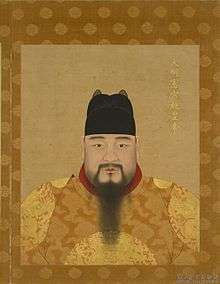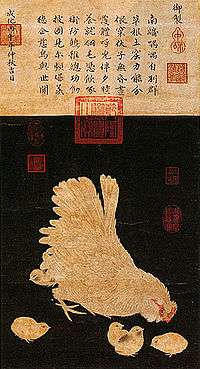Chenghua Emperor
| Chenghua Emperor 成化帝 | |||||||||||||||||
|---|---|---|---|---|---|---|---|---|---|---|---|---|---|---|---|---|---|
 | |||||||||||||||||
| 9th Emperor of the Ming dynasty | |||||||||||||||||
| Reign | 28 February 1464 – 9 September 1487 | ||||||||||||||||
| Coronation | 28 February 1464 | ||||||||||||||||
| Predecessor | Tianshun Emperor | ||||||||||||||||
| Successor | Hongzhi Emperor | ||||||||||||||||
| Born | 9 December 1447 | ||||||||||||||||
| Died | 9 September 1487 (aged 39) | ||||||||||||||||
| Burial | Ming tombs, Beijing | ||||||||||||||||
| |||||||||||||||||
| House | Ming dynasty | ||||||||||||||||
| House | House | ||||||||||||||||
| Father | Zhengtong Emperor | ||||||||||||||||
| Mother | Empress Xiaosu | ||||||||||||||||
The Chenghua Emperor (Chinese: 成化; pinyin: Chénghuà; 9 December 1447 – 9 September 1487), born Zhu Jianshen, was the ninth Emperor of the Ming dynasty in China, between 1464 and 1487. His era name "Chenghua" means "accomplished change".
Childhood
Zhu Jianshen was a son of the Zhengtong Emperor. He was only two years old when his father was captured by the Oirat Mongols and held captive in 1449. After that his uncle, the Jingtai Emperor, took over whilst his father was put under house arrest for almost seven years. During this time, Zhu Jianshen lived under his uncle's shadow and even had his title of crown prince removed while the Jingtai Emperor installed his own son as heir. Zhu Jianshen was only reinstated as crown prince on the eve of the death of the Jingtai Emperor in 1457.

Reign as Emperor
The Chenghua Emperor ascended the throne at the age of 16. During the early part of his administration, he carried out new government policies to reduce tax and strengthen the Ming dynasty. However these did not last and by the closing years of his reign, governmental affairs once again fell into the hands of eunuchs, notably Wang Zhi. Peasant uprisings occurred throughout the country; however, they were violently suppressed. The Chenghua Emperor's reign was also more autocratic than his predecessors' and freedom was sharply curtailed when the emperor established institutes such as the Western Depot (to complement the existing Eastern Depot), monitoring all civilians' actions and words. This institute, not unlike a spy agency, would administer punishment to those whom they suspected of treason. The Western Depot would eventually be shut down but it was the start of a dangerous trend and the Chenghua Emperor's descendants would again revive the Western Depot during the 16th century.
Lady Wan
The Chenghua Emperor was also under the influence of Lady Wan who was an imperial concubine who was seventeen years older than him. Lady Wan had been a mother figure to the young emperor, rearing and protecting the young prince but after ascending the throne she quickly became the emperor's favourite consort after giving birth to a child in 1466. Although Lady Wan's only son died shortly thereafter, she would come to dominate the Emperor's harem for nearly two decades. Lady Wan would employ eunuchs to oversee the harem and report back to her if any concubines became pregnant. Tactics including the forced abortions and even murders of members of the harem resulting in the Chenghua Emperor lamenting that by the age of thirty one that he still lacked a male heir. It was only then revealed to the Emperor that a male heir, the future Hongzhi Emperor was secretly saved and raised in a secure location outside the palace. After reuniting with the young prince, Zhu Youcheng was created crown prince. Lady Wan died in 1487 and shortly after the Chenghua Emperor died in 1487, after 23 years on the throne. He was buried in the Maoling (茂陵) mausoleum of the Ming Dynasty Tombs.
Legacy
The Chenghua Emperor's reign can be distinguished by his early attempts to reform the government and trying his best to rule the country. His reign also saw a cultural flourishing with famous persons such as Hu Juren and Chen Baisha dominating the academic scene. However, the Chenghua Emperor's reign was prone to dominating individuals in the government and the emperor was easily influenced into granting favours based on who he liked rather than their abilities. This led to the degradation of the ruling class and wasteful spending by corrupt individuals which eventually depleted the Ming government's coffers.
Family
- Parents:
- Zhu Qizhen (英宗 朱祁鎮; 1427 – 1464)
- Empress dowager Zhou (孝肅皇后 周氏; 1430 – 1504)
- Consorts and Issue:
- Empress Wu (皇后 吳氏; d. 1509)
- Empress Wang (孝貞純皇后 王氏; d. 1518)
- Posthumous empress Ji (孝穆皇后 紀唐妹; 1451 – 1475), personal name Tangmei
- Zhu Youcheng (孝宗 朱佑樘; 1470 – 1505)
- Grand empress dowager Shao (孝惠皇后 邵氏; d. 1522)
- Zhu Youwan (獻皇帝 朱佑杬; 1476 – 1519)
- Zhu Youlun (岐惠王 朱佑棆; 1478 – 1501)
- Zhu Youyun (雍靖王 朱佑枟; 1481 – 1507)
- Second rank consort Wan (恭肅皇貴妃 萬貞兒; 1428 – 1487), personal name Zhen'er
- Unnamed son (1466)
- Fourth rank consort Bo (端順賢妃 柏氏; d. 1527)
- Zhu Youji (悼恭皇太子 朱佑極; 1469 – 1472)
- Fourth rank consort Wang (莊靖順妃 王氏; 1448 – 1495)
- Princess Renhe (仁和公主; c. 1474 – 1544)
- Fourth rank consort Liang (恭惠和妃 梁氏; d. 1533)
- Fourth rank consort Wang (端榮昭妃 王氏)
- Fourth rank consort Guo (靖順惠妃 郭氏; d. 1491)
- Princess Yongkang (永康公主; 1478 – 1547)
- Fourth rank consort Zhang (莊懿德妃 張氏; d. 1497)
- Zhu Youbin (益端王 朱佑檳; 1479 – 1539)
- Zhu Youhui (衡恭王 朱佑楎; 1479 – 1538)
- Zhu Youpeng (汝安王 朱佑梈; 1484 – 1541)
- Fourth rank consort Yao (端懿安妃 姚氏; d. 1491)
- Zhu Youzhi (壽定王 朱佑榰; 1481 – 1545)
- Fourth rank consort Yang (榮惠恭妃 楊氏)
- Zhu Youshun (涇簡王 朱佑橓; 1485 – 1537)
- Zhu Youkai (申懿王 朱佑楷; 1487 – 1503)
- Fourth rank consort Pan (康順端妃 潘氏; d. 1538)
- Zhu Youshu (榮莊王 朱佑樞; 1486 – 1539)
- Fourth rank consort Wang (恭懿敬妃 王氏; 1465 – 1510)
- Unnamed son (1483)
- Fourth rank consort Zhang (昭順麗妃 章氏; d. 1501)
- Lady Zhu
- Fourth rank consort Yue (和惠靜妃 岳氏; 1465 – 1534)
- Princess Xianyou (仙遊公主; 1487 – 1492)
- Fourth rank consort Tang (靖僖榮妃 唐氏; d. 1524)
- Unknown
- Princess Deqing (德清公主; c. 1481 – 1548)
- Unnamed daughter
- Princess Changtai (長泰公主; d. 1487)
See also
References
- ↑ His original given name Jianjun was changed into Jianshen in 1457 when his father was restored on the throne as the Tianshun Emperor.
¹ Imperial China – 900–1800, F.W. Mote, Page 630, First Harvard University Press, 2003.
Chenghua Emperor Born: December 9 1447 Died: September 9 1487 | ||
| Regnal titles | ||
|---|---|---|
| Preceded by The Tianshun Emperor |
Emperor of China 1464–1487 |
Succeeded by The Hongzhi Emperor |
.jpg)